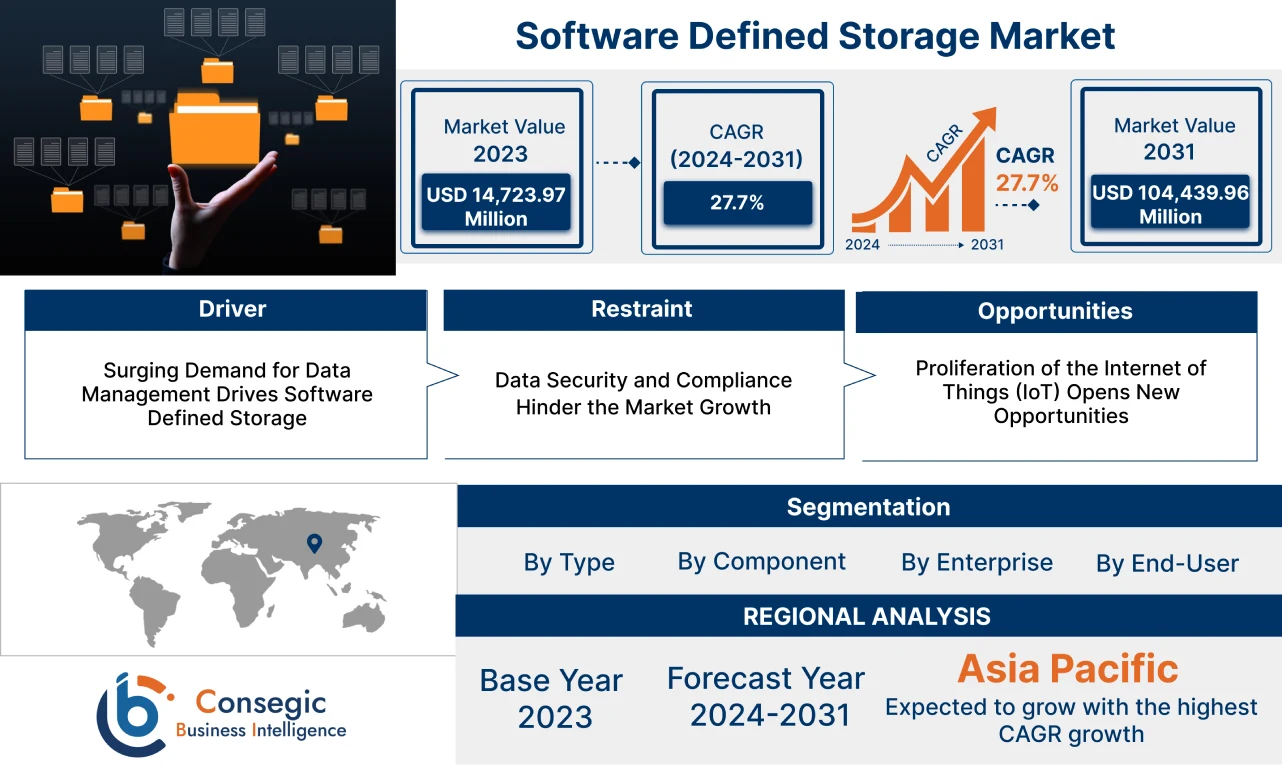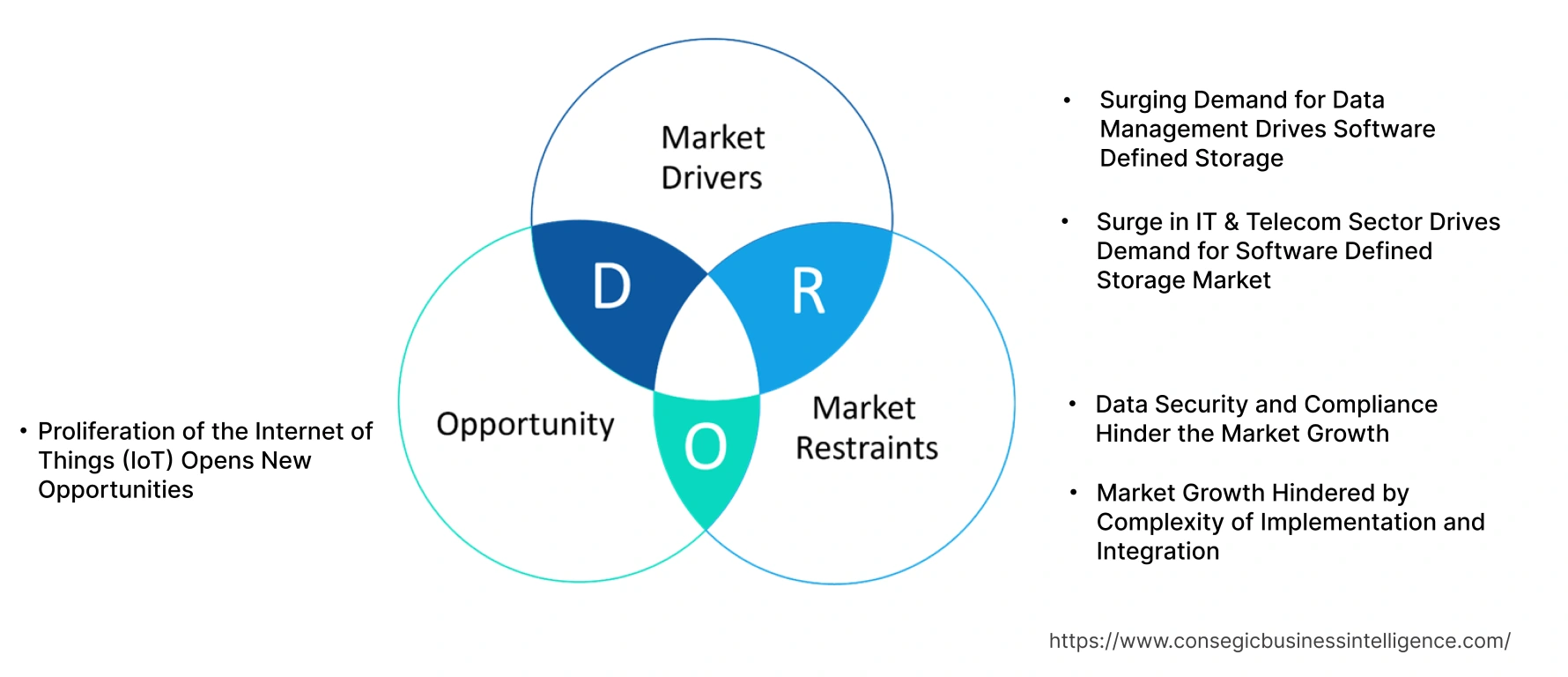Software Defined Storage Market Size:
Global Software Defined Storage Market size is estimated to reach over USD 104,439.96 Million by 2031 from a value of USD 14,723.97 Million in 2023 and is projected to grow by USD 18,547.20 Million in 2024, growing at a CAGR of 27.7% from 2024 to 2031.
Software Defined Storage Market Scope & Overview:
Software Defined Storage (SDS) is a data storage approach that separates storage resources from the physical storage hardware through a software layer. It is designed to work on any industry-standard system, thus eliminating dependence on proprietary hardware. It is characterized by abstracting logical storage services from physical storage systems, making storage provisioning policy-driven, using commodity hardware, and providing typical storage services, including data duplication and replication. The benefits include independence from hardware vendor lock-in, programmability, automation, scalability, and efficiency. It finds application across various industries such as BFSI, IT & telecom, government & defense, healthcare, education, retail, manufacturing, and others. One of the primary drivers includes the cost-benefit and flexibility it offers from being tied to a specific hardware vendor, allowing organizations to opt for less expensive standard hardware.
Software Defined Storage Market Insights:
Software Defined Storage Market Dynamics - (DRO) :
Key Drivers:
Surging Demand for Data Management Drives Software Defined Storage
Businesses and organizations generate and utilize more data from various sources due to which efficient and effective data storage and management become crucial. It provides a flexible and scalable solution, allowing organizations to better manage their data influx. This, in turn, drives the need for storage solutions. It's a cycle where the need for better data handling fuels the demand, and the capabilities of defined storage further enhance data handling efficiency.
Factors including the need for flexible and scalable solutions, the focus on data mobility and hybrid cloud adoption, and others are primary aspects fostering the growth of the BFSI, IT & telecom, Healthcare, and other sectors.
- In November 2023, DDN a global leader in AI and multi-cloud data management, announced DDN Infinia, a next-gen SDS platform. DDN Infinia offers multi-tenancy at scale, containerization, high speed and efficiency, easy management, and robust security. Its innovative architecture simplifies and accelerates workflows to meet current and future data management needs.
Therefore, the growing demand for data management is driving the SDS, in turn proliferating the market growth.
Surge in IT & Telecom Sector Drives Demand for Software Defined Storage Market
The volume of data generated by the IT & telecom sector is growing, which in turn also increases the data processing. This surge in data necessitates efficient and scalable storage solutions is what SDS offers. SDS provides flexibility, scalability, and cost-effectiveness, making it an ideal solution for managing the increasing data loads in the IT & Telecom sector. Furthermore, as these industries continue to adopt advanced technologies like AI and IoT, which generate massive amounts of data, the need for SDS is expected to grow even more.
- In April 2021, IBM plans to introduce IBM Spectrum Fusion, a container-native defined storage solution. It aims to simplify data access across data centers, edge locations, and hybrid clouds by integrating IBM's parallel file system technology and data protection software.
Hence, the advancements in the IT & Telecom sectors are indeed driving the SDS market.
Key Restraints :
Data Security and Compliance Hinder the Market Growth
SDS involves the storage and management of vast amounts of data, ensuring the security of this data is paramount. Any breach can lead to significant losses and damage to an organization's reputation. Moreover, different regions have different data protection and privacy laws. Compliance with these varying regulations can be challenging for organizations implementing SDS, especially those operating in multiple countries. Non-compliance can result in hefty fines and legal complications, further impeding the market of SDS.
- In July 2023, a data breach on Maximus Federal Services' network impacted around 612,000 Medicare beneficiaries. The Department of Health and Human Services (HHS) and Centers for Medicare & Medicaid Services(CMS) responded that no systems were affected.
Therefore, while SDS offers numerous benefits, concerns around data security and regulatory compliance present considerable challenges to its widespread adoption.
Market Growth Hindered by Complexity of Implementation and Integration
The complexity associated with the implementation and integration of SDS acts as a significant roadblock to its market expansion. While SDS offers flexible and efficient storage solutions, setting it up and ensuring its stability can be quite challenging. The need to validate and optimize hardware for the storage software, and maintain this optimization over time, requires considerable effort. Moreover, organizations often have a mix of storage solutions from various vendors, leading to a complex environment that's difficult to manage.
- According to Pure Storage, Inc. SDS has been promoted as a flexible and cost-effective alternative to traditional storage. New storage solutions promise SDS benefits with added features and scalability, but they have challenges, including complex implementations, stability issues, and inefficient resource usage. These systems can be difficult to deploy and manage, and they may pose long-term risks to both hardware and software environments. As modern workloads evolve, organizations need efficient and performant data platforms.
Therefore, these complexities discourage organizations from adopting SDS, thereby slowing down its market evolution.
Future Opportunities :
Proliferation of the Internet of Things (IoT) Opens New Opportunities
The widespread adoption of IoT presents new opportunities for SDS. The data generated by IoT devices necessitates scalable and flexible storage solutions, which SDS can provide. Furthermore, SDS supports real-time data processing, a common requirement for IoT applications. As the number of IoT devices multiplies, SDS offers a cost-effective storage solution by enabling the use of commodity hardware. In addition, SDS caters to the needs of edge computing, a common scenario in IoT applications, by offering decentralized storage solutions that reduce latency and enhance performance.
- According to the State of IoT—spring 2023 report by IoT Analytics, there was an 18% increase in global IoT connections in 2022, reaching 14.3 billion active IoT endpoints. The report further predicts a 16% progress in 2023, expecting the number of connected IoT devices worldwide to reach 16.7 billion active endpoints.
Hence, the rising adoption of IoT is anticipated to increase the utilization of SDS in turn promoting software defined storage market opportunity during the forecast period.
Software Defined Storage Market Segmental Analysis :
By Type:
Based on the type, the market is segmented into block storage, file storage, object storage, and others.
Trends in the types:
- Object storage is becoming increasingly popular in the software defined storage market due to its capability to manage unstructured data on a large scale.
- File storage is popular in the software defined storage market due to its ability to store data in a hierarchical structure.
The block storage segment accounted for the largest revenue share in the year 2023 and is anticipated to register the fastest CAGR during the forecast period.
- Block storage is engineered to play a crucial role in workloads that are sensitive to performance like databases and virtual machine storage, where low latency is essential.
- According to the analysis, many traditional enterprise applications depend on block storage for its ability to provide direct access to data blocks, facilitating efficient data manipulation and transaction processing.
- The surge in the need for reliable, high-performance storage, coupled with the cost-effectiveness and quick deployment capabilities of block storage, further contributed to its dominance in the market.
- In May 2023, NetApp launched new products including a modern block storage offering and a ransomware recovery guarantee. The new ASA (All-Flash SAN Array) A-Series family simplifies SAN infrastructure deployment, offers guaranteed availability and efficiency, and leads to cost savings.
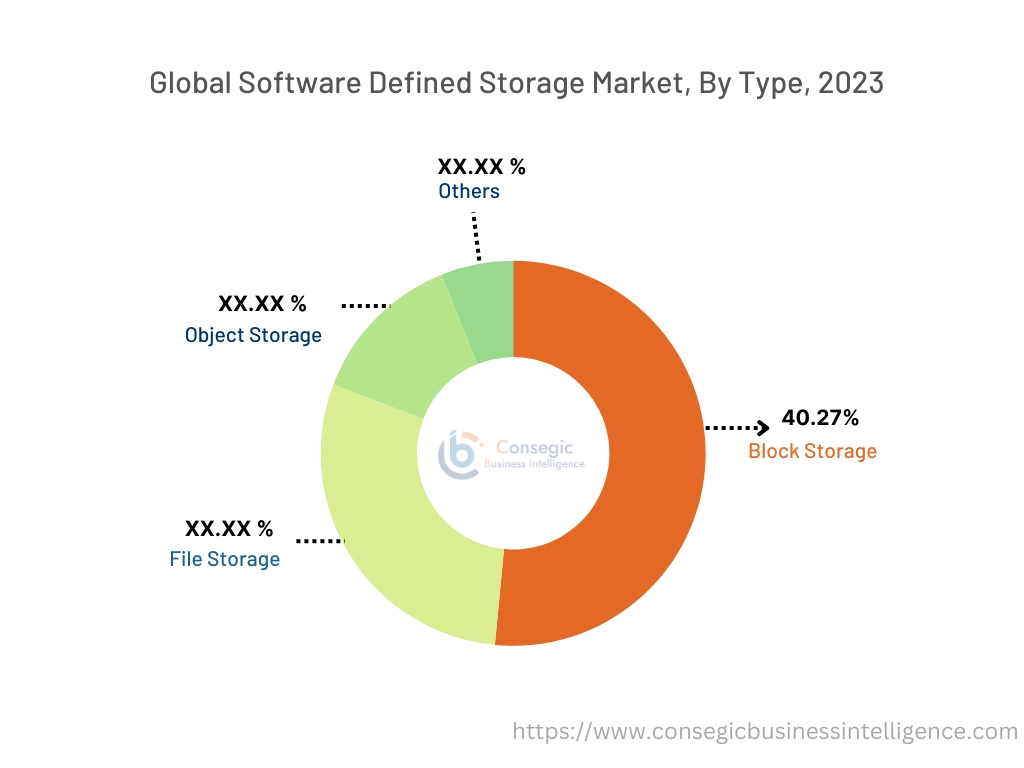
By Component:
Based on the component, the market is bifurcated into platforms and services.
Trends in the component:
- The increasing need for professional and managed services to support the deployment and maintenance of software defined storage market solutions.
The services segment accounted for the largest revenue share in the year 2023 and is anticipated to register the fastest CAGR during the forecast period.
- This evolution is primarily driven by the rising adoption of cloud-based services like SaaS, IaaS, and PaaS, which help businesses streamline operations, cut IT infrastructure costs, and improve scalability.
- The shift from traditional on premise software licenses to flexible, scalable, and cost-effective subscription-based cloud services is also boosting the segment's revenue.
- The widespread use of SaaS applications such as CRM, ERP, and collaboration tools, along with the increasing software defined storage market demand for managed cloud services for tasks like cloud migration, optimization, and maintenance, are further contributing to the segment's progress.
- Additionally, the analysis shows that ongoing advancements in cloud technologies, including the integration of AI, machine learning, and edge computing, are fueling the cloud-based services and solutions, thereby driving the services segment.
- In April 2023, Quantum introduced Myriad, an all-flash file and object storage service that excels with the constraints of traditional NAS systems. Its cloud-native architecture, built on recent advancements in application frameworks and design, offers an easy-to-use solution that sidesteps the limitations of hardware-focused designs.
- Thus, the services segment is driving the software defined storage market trends due to its ability to handle the rising adoption of cloud-based services like SaaS, IaaS, and PaaS.
By Enterprise:
Based on the enterprise, the market is bifurcated into small and medium enterprises and large enterprises.
Trends in the enterprise:
- The rising demand for secure and reliable storage solutions that can support rigorous applications is prevailing in the banking and financial sectors.
The large enterprise segment accounted for the largest revenue share in the year 2023 and is anticipated to register the fastest CAGR during the forecast period.
- Large enterprises due to their larger IT budgets, which allow for the adoption of advanced storage solutions like software defined storage.
- Their focus on enhancing security compliance, increasing efficiency, reducing operating expenses and downtime, and accelerating time-to-market also contributed to this dominance.
- Additionally, as per the analysis, the industry's growing emphasis on automation, simplified management, data mobility, hybrid cloud adoption, and the need for flexible and scalable solutions further boosted the software defined storage market share of large enterprises.
- In May 2024, NetApp unveiled new AFF A-Series systems designed for the AI era, capable of powering IT workloads, including GenAI, VMware, and enterprise databases. Along with expanded capabilities across its portfolio, NetApp aims to enhance operational efficiency for customers using their data to foster innovation.
- As per the analysis of NetApp, successful AI implementation relies heavily on data (74%) and IT infrastructure (71%). NetApp's latest offerings aim to address these critical factors, providing an innovative intelligent data infrastructure that enables customers to harness their data's value with AI.
- Thus, the market analysis concludes that the large enterprise segment's growing emphasis on automation, simplified management, data mobility, and others is driving the market trends.
By End-User:
Based on the end-user, the market is segmented into IT & telecom, BFSI, logistics and warehouse, healthcare, media, and others.
Trends in the end-users:
- The market is driven by rapid industrialization, increased usage of cloud-based infrastructure, and substantial R&D investments from leading market players like NetApp Inc., IBM Corporation, and VMware Inc.
The BFSI accounted for the largest revenue share in the year 2023 and is anticipated to register the fastest CAGR during the forecast period.
- This is primarily due to the sector's massive data generation, stringent regulatory compliance requirements, need for cost efficiency, the importance of business continuity, and ongoing digital transformation efforts. These factors collectively contribute to the increased adoption of storage solutions in the BFSI sector.
- In February 2021, NTT Ltd announced that it is bolstering the IT infrastructure of a top-tier Indian bank by implementing its software defined infrastructure solutions. By integrating an SDS solution with the bank's existing private cloud, NTT has improved efficiencies within the virtualized environment, thereby facilitating business agility and more efficient resource allocation.
- Thus, the growing need for data management and processing in the BFSI sector is driving the market trends.
Regional Analysis:
The regions covered are North America, Europe, Asia Pacific, Middle East and Africa, and Latin America.
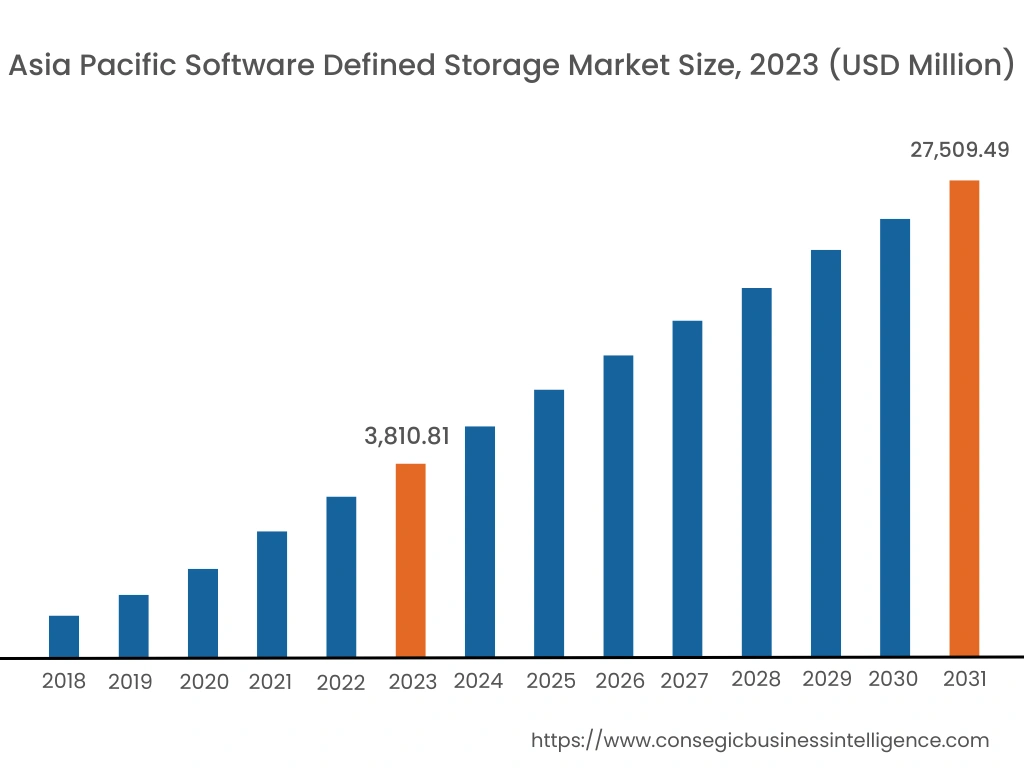
North America is estimated to reach over USD 38,047.48 Million by 2031 from a value of USD 5,351.80 Million in 2023 and is projected to grow by USD 6,742.72 Million in 2024. The software defined storage market growth is mainly driven by its deployment in data centers, cloud service providers, and telecommunication industries.
- In November 2021, DataCore Software the U.S. leading provider of SDS solutions, announced its acquisition of MayaData, the creator of OpenEBS and MayaStor. DataCore is capable of serving as a comprehensive resource for enterprise software-defined storage requirements, encompassing block, file, and object storage. MayaData stands to gain from DataCore's engineering process, patent collection, robust market presence, and distribution network.
Furthermore, factors including increased data generation, the need for cost-effective data management solutions, and the shift towards digitization are projected to drive the market in North America during the forecast period.
Asia Pacific region was valued at USD 3,810.81 Million in 2023. Moreover, it is projected to grow by USD 4,807.41 Million in 2024 and reach over USD 27,509.49 Million by 2031. Out of this, China accounted for the maximum revenue share of 33.7%.
The Asia Pacific region's growing increasing adoption of online payment offers lucrative growth prospects for the market. Additionally, the development of unstructured data stored in on premise and cloud-based storage is driving software defined storage market growth.
- In January 2021, the Reserve Bank of India, (RBI) developed a composite Digital Payments Index (DPI) to measure the level of digital payments across India. The index, which uses March 2018 as the base period with a DPI score of 100, showed significant development with scores of 153.47 and 207.84 for March 2019 and March 2020 respectively with the increasing DPI vast amount of data is generated which in turn requires an advance software defined storages for more secure, agile and data management issues.
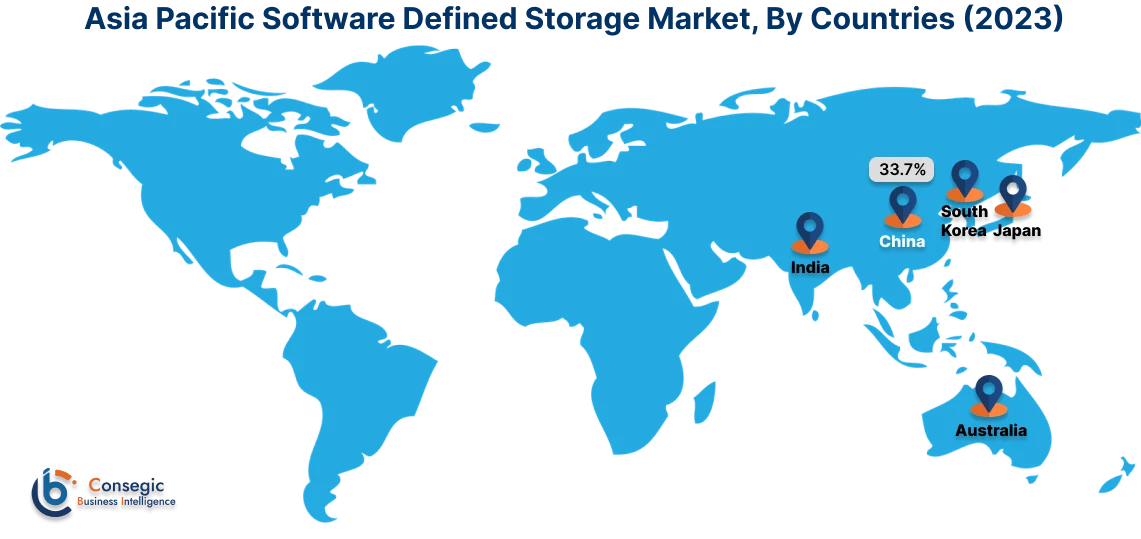
As per the software defined storage market analysis, Europe is anticipated to witness substantial progress that is backed by the well-established information technology (IT) and automotive industries. Companies invest in innovative technologies to cater to the surging demand for software defined storage markets across the region.
The Middle East & African market is expected to show a moderate growth rate during the forecast period. The rise in cloud computing, investments in data centers, the growing telecom sector, and others are anticipated to drive the market.
The Latin American market depicts cumulative expansion in countries such as Brazil, Mexico, and others as there is growing adoption of e-commerce and digital payments as well as big data and analytics.
Top Key Players & Market Share Insights:
The software defined storage market is highly competitive with major players providing solutions to the national and international markets. Key players are adopting several strategies in research and development (R&D), product innovation, and end-user launches to hold a strong position in the software defined storage market. Key players in the software defined storage industry include-
- Nutanix (U.S)
- Red Hat, Inc (U.S)
- IBM (New York)
- Nexenta OS (U.S)
- DataCore SANsymphony (Florida)
- StarWind (U.S)
- DataCore (Florida)
- VMware LLC (U.S)
- NetApp, Inc. (U.S)
- StorMagic Ltd. (U.K)
Recent Industry Developments :
Product Launches
- In May 2024, Hewlett Packard Enterprise (HPE) introduced the HPE GreenLake cloud to streamline the management and optimization of storage, data, and workloads across on-premises and public cloud environments. This includes the launch of HPE GreenLake Block Storage for AWS, which supports NVMe capacity scaling up to 5.6PB.
- In May 2024, DataCore launched Single Node Swarm, a software defined object storage solution. This strategic initiative is designed to meet the specific needs of IT organizations, especially in smaller storage deployments and edge locations where local data storage and processing are crucial.
- In April 2024, Hitachi Vantara, a subsidiary of Hitachi, Ltd., launched the Hitachi Virtual Storage Platform One. This hybrid cloud platform is set to transform the way organizations manage and leverage their data in the rapidly evolving technological landscape.
- In February 2024, Puget Systems announced the launch of a new line of custom defined storage solutions, expanding its product range. The new Puget Storage family is a Software defined Storage solution developed in collaboration with OSNexus. It utilizes the Quantastor platform to offer scalable and flexible media asset storage for both local and remote users.
Mergers & Acquisitions
- In January 2023, DataCore Software acquired Object Matrix, a leading object storage and media archive specialist. The top-tier appliances and cloud services of Object Matrix will be integrated into DataCore's Perifery portfolio, which is known for its comprehensive, application-centric solutions for an edge, including media and entertainment. This acquisition strengthens the Perifery line of edge devices and solutions and brings exceptional talent and expertise to the Perifery team.
Partnerships & Collaborations
- In April 2024, NetApp expanded its partnership with Google Cloud to facilitate the use of data for generative AI and other hybrid cloud workloads. They are introducing the Flex service level for Google Cloud NetApp Volumes, supporting storage volumes of virtually any size.
Funding
- In July 2023, Hammerspace secured $56.7 million in its initial round of institutional funding. Hammerspace has aimed to make all enterprise data globally accessible and indispensable, thereby driving business innovation. The funding round includes Prosperity7 Ventures, Pier 88 Ventures, ARK Invest, and others marking a significant milestone for the company.
Enhancement in Product
- In May 2024, Infinidat announced the introduction of its next-generation InfiniBox G4 family of storage arrays, designed for both all-flash and hybrid configurations. Infinidat has strategically expanded its Storage-as-a-Service (STaaS) offerings through the advancement of its InfiniVerse platform.
Memorandum of Understanding (MoU)
- In May 2024, Samsung SDS is partnering with Incheon International Airport Corporation (IIAC) and Telecommunications Technology Association (TTA) to foster business innovation. They've signed a memorandum of understanding to implement hyper-automation across IIAC's business. Samsung will provide "Brity Meeting" and "Brity Copilot" to automate tasks, develop services, offer test beds, and explore new digital technologies with IIAC and TTA
Software Defined Storage Market Report Insights :
| Report Attributes | Report Details |
| Study Timeline | 2018-2031 |
| Market Size in 2031 | USD 104,439.96 Million |
| CAGR (2024-2031) | 27.7% |
| By Type |
|
| By Component |
|
| By Enterprise |
|
| By End-User |
|
| By Region |
|
| Key Players |
|
| North America | U.S. Canada Mexico |
| Europe | U.K. Germany France Spain Italy Russia Benelux Rest of Europe |
| APAC | China South Korea Japan India Australia ASEAN Rest of Asia-Pacific |
| Middle East and Africa | GCC Turkey South Africa Rest of MEA |
| LATAM | Brazil Argentina Chile Rest of LATAM |
| Report Coverage |
|
Key Questions Answered in the Report
How big is the software defined storage market? +
Global Software Defined Storage Market size is estimated to reach over USD 104,439.96 Million by 2031 from a value of USD 14,723.97 Million in 2023 and is projected to grow by USD 18,547.20 Million in 2024, growing at a CAGR of 27.7% from 2024 to 2031.
Which is the fastest-growing region in the software defined storage market? +
Asia Pacific is the fastest-growing region in the software defined storage market.
What specific segmentation details are covered in the software defined storage report? +
The software defined storage report includes specific segmentation details for type, component, enterprise, end-users, and region.
Who are the major players in the software defined storage market? +
The key participants in the software defined storage market are Nutanix (U.S), Red Hat, Inc.(U.S), DataCore (Florida), IBM (New York), Nexenta OS (U.S), DataCore SANsymphony (Florida), StarWind (U.S), VMware LLC (U.S), NetApp, Inc. (U.S), StorMagic Ltd.(U.K), and others.
